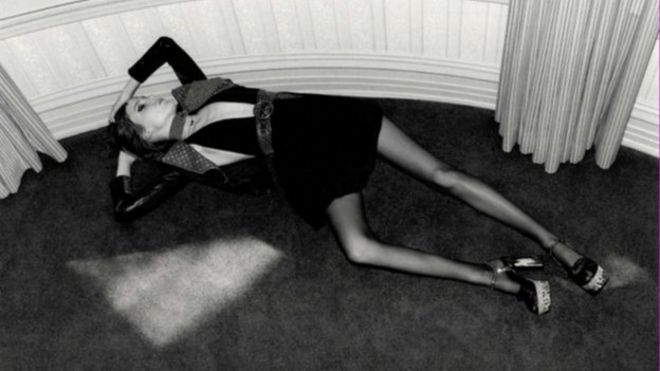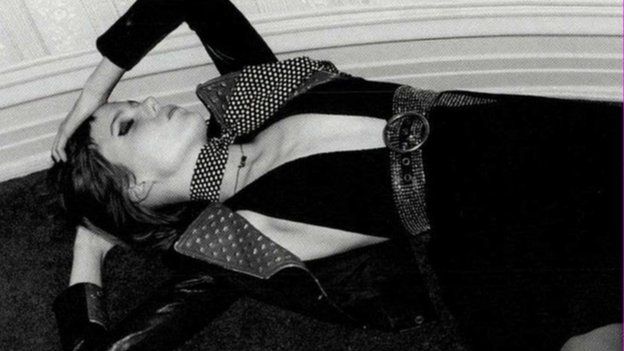- 1 hour ago
- UK
- 359

An Yves Saint Laurent advertisement featuring an "unhealthily underweight" model has been banned by the Advertising Standards Authority (ASA).
The advert, which appeared in Elle UK magazine, featured a photo of a woman whose rib cage was visible and appeared prominent, the regulator said.
It upheld a reader's complaint that the advert was "irresponsible" for using a model who appeared unhealthily thin.
Yves Saint Laurent (YSL) and Elle UK declined to comment on the ruling.
The ASA said YSL "indicated that they did not agree with the complainant's view that the model was unhealthily thin" but did not provide a detailed response.
Elle UK told the watchdog it had no comment to make on the complaint.

The ASA said the model's pose and the lighting drew particular focus to her chest, where her rib cage was visible and appeared prominent, and to her legs, where her thighs and knees appeared a similar width.
It said: "We therefore considered that the model appeared unhealthily underweight in the image and concluded that the ad was irresponsible."
It ruled that the advert must not appear again in its current form, adding: "We told the advertisers to ensure that the images in their ads were prepared responsibly."
'Dangerous catalyst'
The charity Anorexia and Bulimia Care (ABC) said it hoped the ASA's ruling sends a "clear message" to other media and fashion companies, which it said have a "great responsibility".
An ABC spokesperson told the BBC: "We applaud the ASA for taking the necessary action to ban the YSL advert on the grounds of it being 'irresponsible.'
"While eating disorders are most often caused by underlying emotional issues or events, the impact of the media on vulnerable young people can act as a dangerous catalyst - triggering disordered thinking and behaviour.
"Adverts using underweight models are promoting a distorted image of beauty and yet this has become the norm in the UK."
The ASA's ruling came as figures from the NHS showed that the number of hospital admissions across the UK for teenagers with eating disorders has nearly doubled in the last three years.

The Royal College of Psychiatrists said much of the increase was down to social pressure made worse by online images.
College spokesperson Dr Carolyn Nahman said she was worried about what she described as the sometimes fatal consequences of vulnerable teenagers putting themselves under pressure by looking at pictures of "ideal bodies" repeatedly on social media.
The eating disorder charity Beat cautioned that the rise in disorders reported by the NHS could also be due to better diagnosis and awareness, but said it showed it is "vital" that we protect young people from "excessive influences".
A Beat spokesperson told the BBC: "The ASA ruling is not about whether this person in the picture is healthy, but whether the images of her are being used in a way that can have an irresponsible effect on others and we are really pleased to see that they are taking action to uphold their responsibility for the social impact of adverts, as well as judging whether they are legal, decent, honest and truthful."
The charity said that the "constant portrayal" of a very slender look needs to challenged in order for young people to grow up with a robust sense of self-worth.
Catwalk ban
In April, French MPs approved a law to ban the use of catwalk fashion models deemed to be excessively thin.
Under the new law, modelling agencies which employ models below a certain Body Mass Index (BMI) level face fines or prison terms.
The law also penalises magazines which fail to state when photos have been retouched - with a fine of €37,500 or up to 30% of the amount spent on the advertising featuring the model.
Ian Twinn, direct of public affairs at Ibsa, a trade body which represents advertisers, said Wednesday's ruling from ASA was "useful in drawing a line over which advertisers must not cross".
He added: "But there can be no simple template. Some people are naturally thin, some of us are sadly not. Advertisers and regulators need to apply common sense, as the ASA has, and not vilify the thin, the rounded and the simply overweight."

Earlier this year, a campaign for the YSL perfume Black Opium was cleared by the ASA in January following complaints that it glamorised and trivialised drug use and addiction.
The French designer Yves Saint Laurent made his name when Christian Dior picked him to become his assistant at the age of 17. When Dior died three years later, Saint Laurent took over the Dior house.
He went on to co-found what was to become the multi-million-pound Saint Laurent fashion and perfume empire in 1962. He died in 2008.
The first major UK exhibition of the fashion of Yves Saint Laurent is to be staged at the Bowes Museum in County Durham next month.

No comments:
Post a Comment